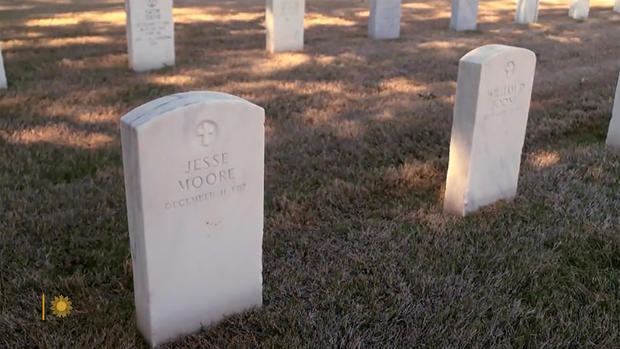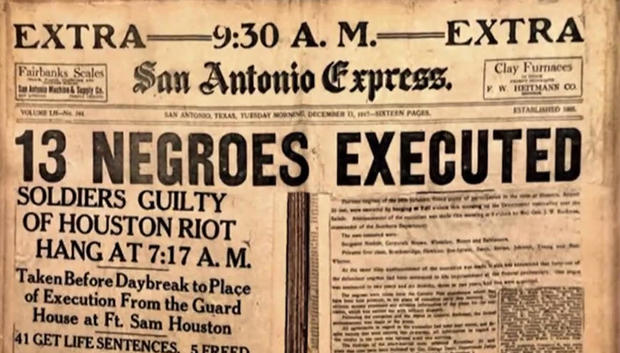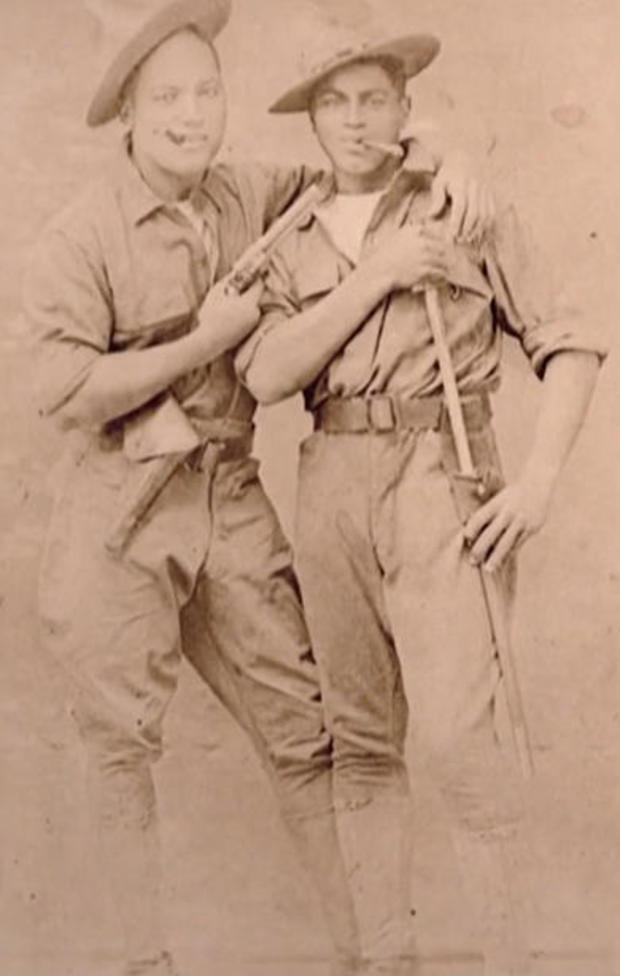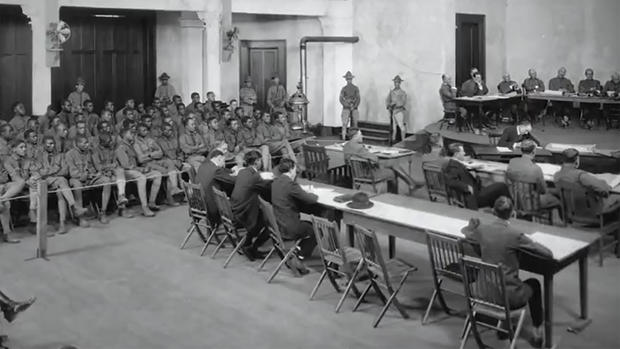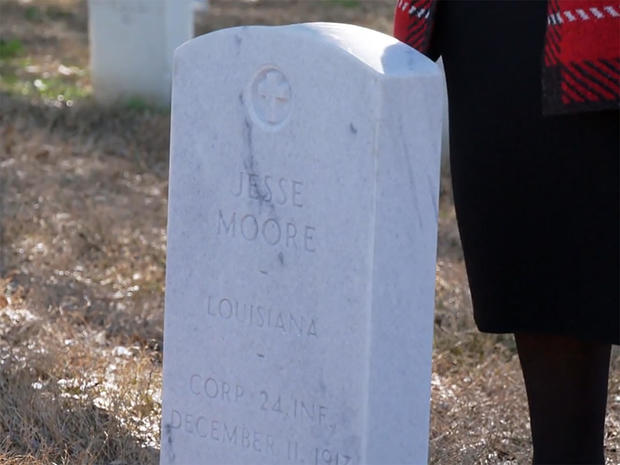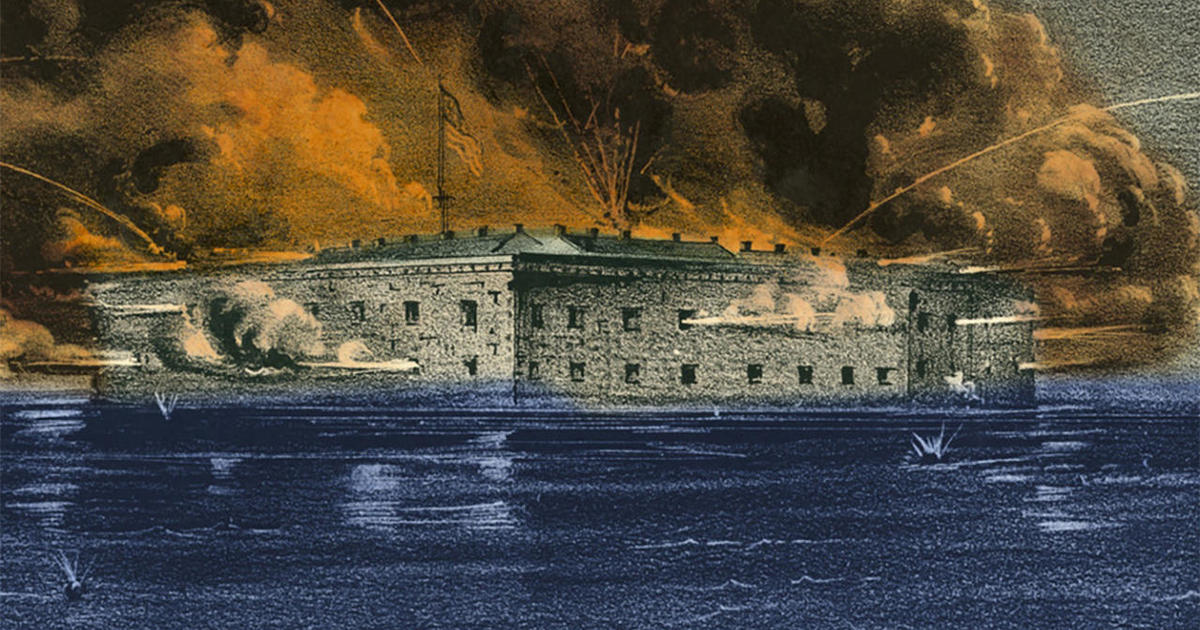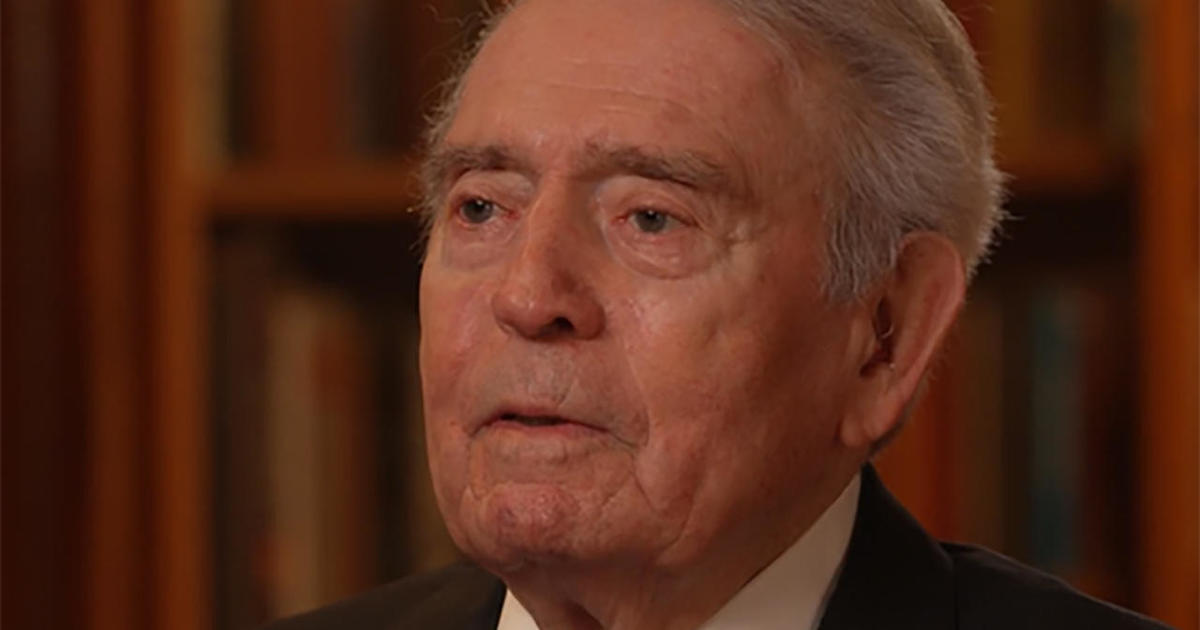U.S. Army restores honor to Black soldiers hanged in Jim Crow-era South
The Veterans Cemetery at Fort Sam Houston in San Antonio, Texas, looks like many others – headstones with name, rank, dates of birth and death, and wars fought. Headstones that each tell a story. Until you reach the row in which headstones, including one for Angela Holder's great-uncle, Cpl. Jesse Moore, are memorialized only by a date: December 11, 1917.
"Ours don't have a story; they just have name and date of death," said Holder. "The first time I came here I touched the headstone and I said, 'Oh, man, this should not have happened to you, but I'm going to do something about that.'"
She first heard what happened to Jesse Moore from her Great-Aunt Lovie: "She had a photograph of him in her home. And I was a six-year-old kid running through the house, and on this particular day it caught my attention and I asked my aunt, 'Who is that? Why do you have his picture?' and all. I was told that that was her brother who had been killed by the Army."
Killed in the largest mass execution in the history of the Army – 13 Black soldiers convicted of mutiny and murder, and hanged with no chance of appeal. Six more hangings would follow.
"My great-uncle, to think that he was standing on a trap door that was going to fall out from under him and his body weight snaps his neck? That really gets to me," Holder said.
John Haymond, a former soldier-turned-historian, said, "The post engineers had worked all night erecting a scaffold with a fairly unique design because it was a one large, single trap door for a simultaneous hanging. Just before sunrise they were hanged. Once the execution was over, their bodies were each placed in plain pine coffins."
The gallows were erected on what is today the Fort Sam Houston golf course. The bodies were buried a short distance away, for 20 years their graves marked only by a number.
Haymond said, "While they were being buried, the engineers began dismantling the scaffold, and by noon there was no sign that there had been anything that happened."
They were members of the all-Black 24th Infantry Regiment, which had served in Mexico and the Philippines.
Jason Holt showed Martin a photo of his great-uncle, PFC Thomas Coleman Hawkins (pictured right, with a friend). "The bravado that's associated with being a military man ... You can see it's in full effect right there in that picture," Holt said.
Was he proud of being in the Army? "He was," Holt replied. "In 1917, one of the things that you could do to make your family proud, and to make your community proud, was to join the Army."
After America entered World War I, troops from the 24th Infantry were sent to Houston to guard a training camp for soldiers being sent to the front in Europe.
Charles Anderson, whose cousin, Sgt. William Nesbit, was among them, believes they should have never been sent to Houston to begin with. Why? "Jim Crow and racism," Anderson replied.
Haymond said, "There's a phrase that I came across doing my research that Houston could be called Jim Crow's hometown."
Would wearing a uniform have given a Black soldier any immunity from Jim Crow? "Not in the least," Haymond said, "especially not in Texas."
Anderson said, "They would never call them soldiers. They would always call them the N-word."
A series of run-ins with white police, and a false rumor that the Black soldiers were about to be attacked, set off a race riot. "All of a sudden, someone shouted, 'Get your guns, boys. There's a mob coming.' And instantly pandemonium breaks out," Haymond said.
Holder noted, "This was the first race riot in which you had more white people than Black people killed."
The soldiers of the 24th were placed under arrest and marched out of town. When T.C. Hawkins' mother asked the army about her son, the reply said only he was "present serving with his organization."
Holt said, "They don't mention any of the things that happened. They don't mention that he's about to be on trial, for a capital crime."
The first and largest of three courts-martial was held – 63 soldiers charged with mutiny and murder. According to Haymond, "Sixty-three men is the largest murder trial not only in the U.S. Army's history, it's the largest murder trial in American history."
Those who would decide the case were all white. The lone defense counsel, Major Harry Grier, was not even an attorney. He was allowed only ten days to prepare his case for the defense. "If you say that one person who's not even a lawyer defended 63 people at one time, on its face it's a miscarriage of justice," said Holt.
Thirteen were condemned to death, but the commanding Gen. John Ruckman kept that verdict secret from them until 12 hours before their execution.
That night T.C. Hawkins wrote his family a final letter, which has been passed down through the generations. Holt said, "One day a box showed up at the house and in the box were his personal effects, the charge sheet, and his last letter. That's how the family found out."
The letter read in part: "When this letter reaches you, I will be beyond the veil of sorrow. … I was sentenced to be hanged for the trouble that took place in Houston, Texas, although I am not guilty of the crime that I am accused."
Anderson said they would have preferred the firing squad over hanging: "It's more dignified."
Dignity denied in death became a lifelong cause for Charles Anderson, Angela Holder and Jason Holt. Their goal: overturning the convictions.
More than a century after the trials, the Army took up the case. Under Secretary of the Army Gabe Camarillo said a case-by-case review found that none of the defendants had received a fair trial. "We reviewed the entire record for all 110 soldiers that were initially court-martialed, and made the determination that all 110 should be overturned," he said. "Very few witnesses were called. There was very little opportunity for cross-examination."
Was race the deciding factor? "I think race was very much a factor," Camarillo said, "both in the circumstances leading to the events of August of 1917, and certainly in the conduct of the trial."
Even by the Jim Crow standards of 1917, justice had been denied. Camarillo said, "Those first 13 individuals that were convicted and executed did not even receive the opportunity to appeal or review their case."
Of the other soldiers convicted but not sentenced to death, many continued to serve prison sentences; some died while in prison.
Martin asked, "Can the Army really right a wrong like this?"
"It's never too late to correct an injustice," Camarillo replied.
In a ceremony last November at the Buffalo Soldiers National Museum in Houston, all the wrongly-convicted soldiers of the 24th Infantry were given honorable discharges.
There will also be new headstones engraved for the men who were hanged. "We'll have information on these headstones that reflect the service that they rendered to their country ... just like the rest of the stones here," Anderson said.
Holder said that, when there is a proper headstone for her great-uncle, "I'll have some completion, some peace."
This past Thursday at Fort Sam Houston National Cemetery, Angela Holder stood watch as proper headstones for her great uncle, and the other unjustly executed soldiers, were unveiled.
Now their story is told.
At the commemoration ceremony, Chaplain James Hall led a prayer: "We ask for forgiveness to our nation and to our Army. We're thankful for a nation that can change, that can adjust, and make amends."
For more info:
- Fort Sam Houston National Cemetery, San Antonio
- Historian John A. Haymond
- Under Secretary of the Army Gabe Camarillo
- Buffalo Soldiers National Museum, Houston
- Houston Memorial Park, Camp Logan
- South Texas College of Law, Houston Mutiny and Riot Records
Story produced by Mary Walsh. Editor: Steven Tyler.
